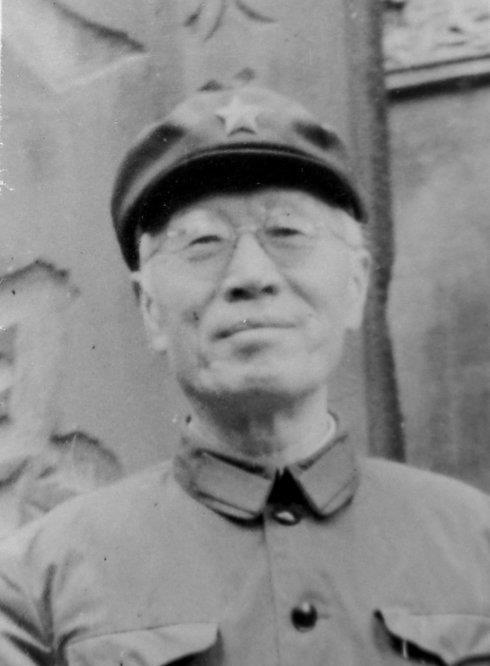Founding Lieutenant General Wan Yi was a close confidant of the young marshal Zhang Xueliang.

In 1925, at the age of 18, Wan Yi was admitted to the 4th Infantry Section of the Northeast Army Non-Commissioned Officer Teaching Team, and the captain was Zhang Xueliang. In the second year, he began to serve as a lieutenant and adjutant in Zhang Xueliang's adjutant office, and later when Zhang Xueliang became deputy commander-in-chief of the army, navy and air force, he accompanied him to Nanjing, where he served as deputy major regimental deputy, major battalion commander, and lieutenant colonel regiment deputy. By 1936, at the age of 29, Wan Yi was the commander of the 627th Regiment of the 109th Division of the Northeast Army, becoming the youngest regimental commander in the Northeast Army.
Why is Wan Yi, a close confidant of the young marshal Zhang Xueliang, a reactionary in the eyes of Chiang Kai-shek?
It turned out that when Wan Yi went to Shaanxi and Gansu with the Northeast Army in 1935, he became acquainted with Liu Lanbo and others who were engaged in united front work in our party, and began to understand the principles of the workers' and peasants' revolution and sympathize with our party's revolutionary ideas. Later, he joined the Anti-Japanese Comrades' Association and supported and covered the secret anti-Japanese rescue work carried out by the members of our Party in the regiment.
In September 1936, when Wan Yi was the commander of the 627th Regiment of the Northeast Army, in order to commemorate the "918" National Shame Day and mobilize troops to resist the war, he personally led the team to carry out an armed parade, sang a song of salvation, and refuted the fallacy that "outside must first be inside".
At this time, the Kuomintang sent a major political trainer to the regiment, and for the purpose of sabotaging anti-Japanese propaganda and reporting merits to his superiors, he actually tore up the anti-Japanese propaganda poster published by the regimental song team in an attempt to take it to his superiors to report his merits.
This slap is terrible, and political trainers cannot be violated casually.
Therefore, Wan Yi's angry beating of the political trainer was soon reported to Chiang Kai-shek.
Later, Chiang Kai-shek said to Zhang Xueliang: "You have a regimental commander who is very reactionary and beats up political trainers!" ”
Zhang Xueliang replied at that time: "Chairman of the committee, leave it to me!" ”
Fortunately, Wan Yi was a close confidant of the young marshal, and the young marshal protected him, and the matter was not resolved. However, Wan Yi, this account of "beating up political trainers," was quietly written down by Chiang Kai-shek, and he would be stabbed at every opportunity.
The "reactionary" in Old Jiang's eyes, Wan Yi, has not stopped since then.
After the Xi'an Incident, Wan Yi was detained by Miao Chengliu, commander of the 57th Army of the Northeast Army, and arrested and imprisoned in February 1937 and released in October 1937 for making a statement that "Zhang Xueliang detained Chiang Kai-shek and personally sent him back, he did not do this right, and he was too serious and righteous."
In early 1940, Wan Yi served as acting brigade commander of the 333rd Brigade of the 111th Division of the 57th Army of the Northeast Army. In September of the same year, he and his division commander Chang Endo launched the "9.22" hoeing campaign against Miao Chengliu, the commander of the 57th Army who was in collusion with the Japanese army, and drove the anti-republican and colluding Japanese commander Miao Chengliu out of the army. However, this hoeing and treachery movement was regarded by Lao Jiang as "ignorant of the general situation, full of arrogance, and although Yun zhongded the party and loved the country, it was difficult to blame the country for mistaking the country." ”
In February 1941, Wan Yi was still arrested and imprisoned in the Rusu Theater Prison. Based on Chiang Kai-shek's opinion, the Division's Military Justice Department convicted him of three crimes: first, he was an accomplice to the "Double Twelve (Xi'an Incident)" incident; and third, he was suspected of being a traitor to the party. These three sins are all capital offenses for killing the head.
On August 2, 1942, the Military Justice Department held a second trial of Wan Yi, and although the verdict was not announced, the next step was naturally to follow Chairman Chiang Kai-shek's "telegram" to carry out the "execution" of this "reactionary" in his eyes. At that time, the Sulu Theater Prison was not a serious prison, but a small farm yard, so there was no high wall. Therefore, Wan Yi decided to flee to the Eighth Route Army. That night, he escaped from his imprisonment and entered the coastal anti-Japanese democratic base area, found the Shandong Branch of the CPC Central Committee, and returned to the embrace of our party.
After the victory of the War of Resistance Against Japanese Aggression, Wan Yi, Lü Zhengcao, Zhang Xuesi, and other former generals of the Northeast Army were the first to go to the northeast, making great contributions to the cause of the liberation of the Chinese people. In 1955, Wan Yi was awarded the rank of lieutenant general and became a senior general in the People's Liberation Army.
More Exciting Articles:
After Japan's surrender, which three units of our army preemptively entered the northeast region?
He was a general of the Northeast Army, launched the "922 Hoe Rape" during the War of Resistance, and led an uprising before his death
This man was highly skilled and bold, pretending to be a flower seller to enter the Japanese military stronghold to find information, and was later awarded the rank of major general